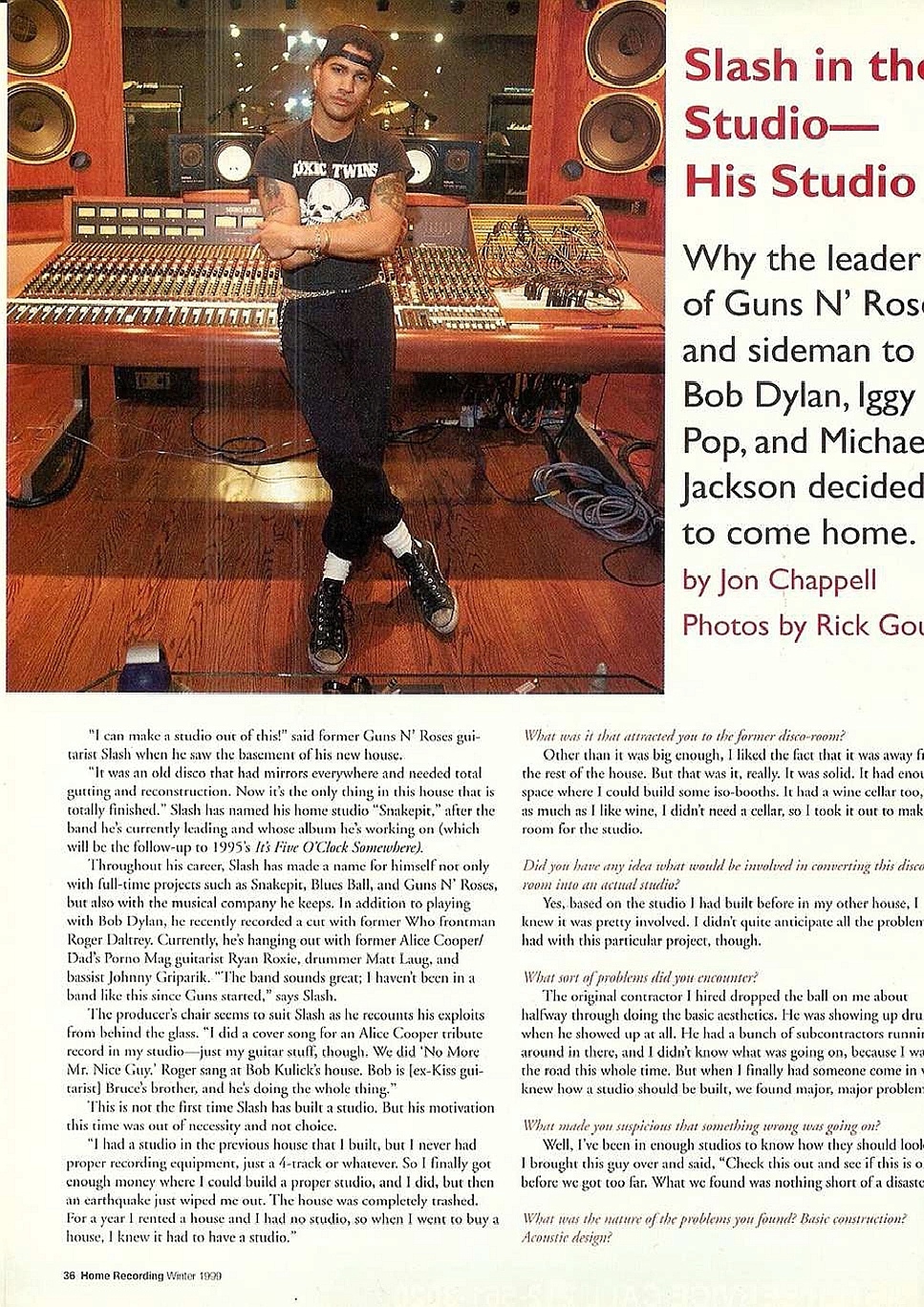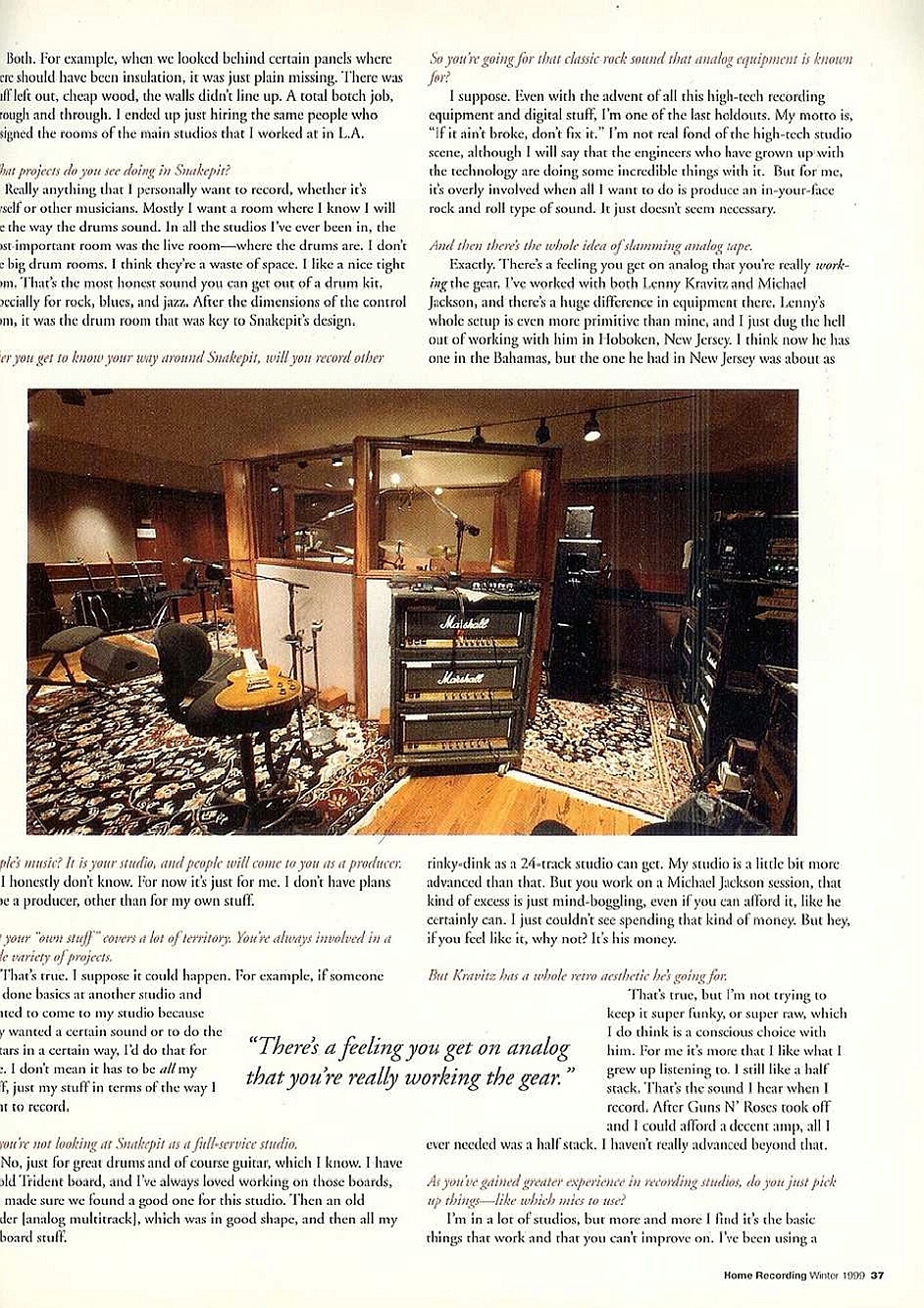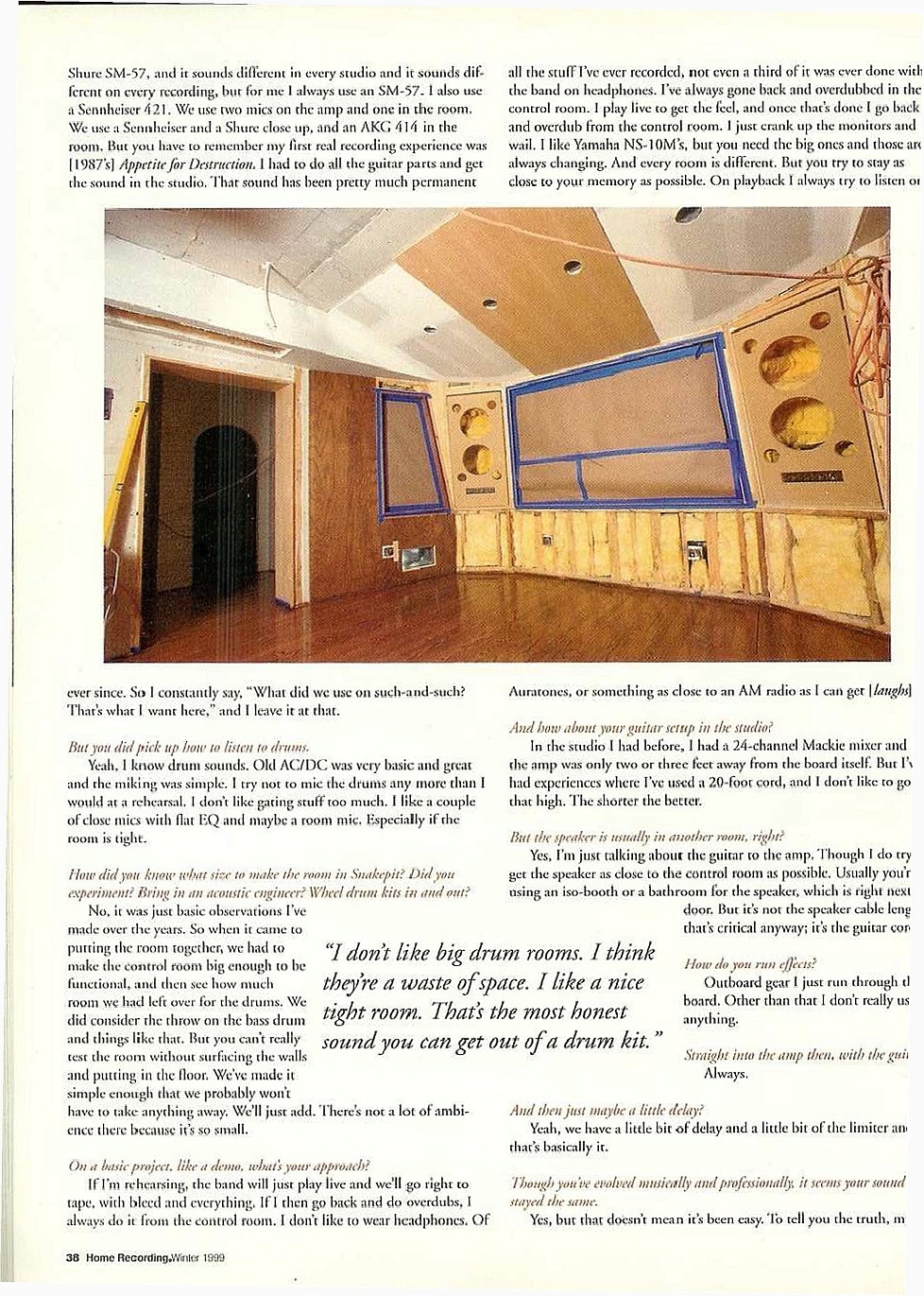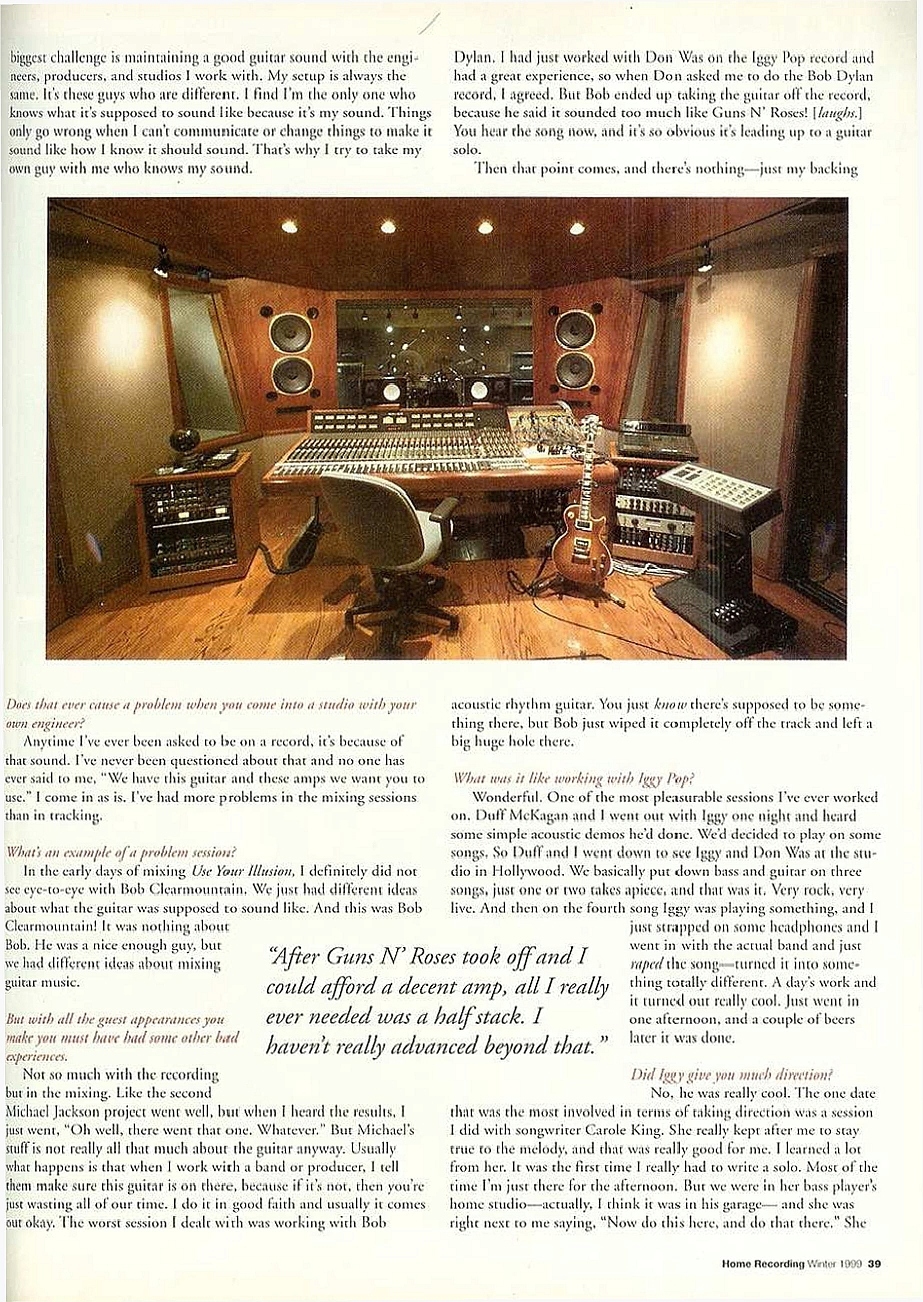1999.01.DD - Home Recording Magazine - Slash In The Studio
Page 1 of 1
 1999.01.DD - Home Recording Magazine - Slash In The Studio
1999.01.DD - Home Recording Magazine - Slash In The Studio





Transcript:
------------------
Slash in the Studio— His Studio
Why the leader of Guns N’ Roses and sideman to Bob Dylan, Iggy Pop, and Michael Jackson decided to come home
by Jon Chappell
Photos by Rick Got
"I can make a studio out of this!" said former Guns N’ Roses guitarist Slash when he saw the basement of his new house.
“It was an old disco that had mirrors everywhere and needed total gutting and reconstruction. Now it's the only thing in this house that is totally finished." Slash has named his home studio "Snakepit,” after the hand he's currently leading and whose album he's working on (which will be the follow-up to 1995's It's Five O'Clock Somewhere).
Throughout his career, Slash has made a name for himself not only with full-time projects such as Snakepit, Blues Ball, and Guns N’ Roses, but also with the musical company he keeps. In addition to playing with Bob Dylan, he recently recorded a cut with former Who frontman Roger Daltrey. Currently, he’s hanging our with former Alice Cooper/ Dad's Porno Mag guitarist Ryan Roxie, drummer Matt Laug, and bassist Johnny Griparik. "The band sounds great; I haven’t been in a band like this since Guns started," says Slash.
The producer's chair seems to suit Slash as he recounts his exploits from behind the glass. "I did a cover song for an Alice Cooper tribute record in my studio - just my guitar stuff, though. We did 'No More Mr. Nice Guy.’ Roger sang at Bob Kulick's house. Bob is (ex-Kiss guitarist) Bruce's brother, and he's doing the whole thing.”
This is nor the first time Slash has built a studio. But his motivation this time was out of necessity and not choice.
"I had a studio in the previous house that I built, but I never had proper recording equipment, just a 4-track or whatever. So I finally got enough money where I could build a proper studio, and I did, but then an earthquake just wiped me out. The house was completely trashed. For a year I rented a house and I had no studio, so when I went to buy a house, I knew it had to have a studio.’’
What was it that attracted you to the former disco-room?
Other than it was big enough, I liked the fact that it was away from the rest of the house. Bur that was it, really It was solid. It had enough space where I could build some iso-booths. It had a wine cellar too, but as much as I like wine, I didn't need a cellar, so I took it out to make room for the studio.
Did you have any idea what would be involved in converting this disco room into an actual studio?
Yes, based on the studio I had built before in my other house, I knew it was pretty involved. I didn’t quite anticipate all the problems I had with this particular project, though.
What sort of problems did you encounter?
The original contractor I hired dropped the ball on me about halfway through doing the basic aesthetics. He was showing up drunk - when he showed up at all. He had a bunch of subcontractors running around in there, and I didn’t know what was going on, because I was on the road this whole time. But when I finally had someone come in who knew how a studio should be built, we found major, major problems.
What made yon suspicious that something wrong was going on?
Well, I’ve been in enough studios to know how they should look. I brought this guy over and said, "Check this out and see if this is okay," before we got too far. What we found was nothing short of a disaster.
What was the nature of the problems you found? Basic construction? Acoustic design?
Both. For example, when we looked behind certain panels where there should have been insulation, it was just plain missing. There was stuff left out, cheap wood, the walls didn't line up. A total botch job, rough and through. I ended up just hiring the same people who designed the rooms of the main studios that I worked at in LA.
What projects do you see doing in Snakepit?
Really anything that I personally want to record, whether it's for myself or other musicians. Mostly I want a room where I know I will like the way the drums sound. In all the studios I've ever been in, the most important room was the live room—where the drums are. I don't like big drum rooms. I think they're a waste of space. I like a nice tight room. That’s the most honest sound you can get out of a drum kit, especially for rock, blues, and jazz. After the dimensions of the control room, it was the drum room that was key to Snakepit's design.
After you get to know your way around Snakepit, will you record other people's music? It is your studio, and people will come to you as a producer.
I honestly don’t know. For now it's just for me. I don’t have plans to be a producer, other than for my own stuff.
(?) "your "own stuff" covers a lot of territory. You're always involved in a wide variety of projects.
That’s true. I suppose it could happen. For example, if someone has done basics at another studio and wanted to come to my studio because they wanted a certain sound or to do the guitars in a certain way, I’d do that for them. I don’t mean it has to be all my stuff, just my stuff in terms of the way I want to record.
So you're not looking at Snakepit as a full-service studio.
No, just for great drums and of course guitar, which I know. I have an old Trident board, and I’ve always loved working on those boards, so made sure we found a good one for this studio. Then an old (?) [analog multitrack], which was in good shape, and then all my soundboard stuff.
So you're going for that classic rock sound that analog equipment is known for?
I suppose. Even with the advent of all this high-tech recording equipment and digital stuff, I'm one of the last holdouts. My motto is, “If it ain’t broke, don’t fix it." I’m not real fond of the high-tech studio scene, although I will say that the engineers who have grown up with the technology are doing some incredible things with it. But for me, its overly involved when all I want to do is produce an in-your-face rock and roll type of sound. It just doesn’t seem necessary.
And then there's the whole idea of slamming analog tape.
Exactly. There’s a feeling you get on analog that you're really working the gear, I’ve worked with both Lenny Kravitz and Michael Jackson, and there's a huge difference in equipment there. Lenny's whole setup is even more primitive than mine, and I just dug the hell out of working with him in Hoboken, New Jersey. I think now he has one in the Bahamas, but the one he had in New Jersey was about as rinky-dink as a 24-track studio can get. My studio is a little bit more advanced than that. But you work on a Michael Jackson session, that kind of excess is just mind-boggling, even if you can afford it, like he certainly can. I just couldn’t see spending that kind of money. But hey, if you feel like it, why not? It’s his money.
But Kravitz has a whole retro aesthetic he's going for.
That's true, but I'm not trying to keep it super funky, or super raw, which I do think is a conscious choice with him. For me it's more that I like what I grew up listening to. I still like a half stack. That's the sound I hear when I record. After Guns N’ Roses took off and I could afford a decent amp, all I ever needed was a half stack. I haven’t really advanced beyond that.
As you've gained greater experience in recording studios, do you just pick up things—like which mics to use?
I’m in a lot of studios, bur more and more I find it's the basic things that work and that you can’t improve on. I've been using a Shure SM-57, and it sounds different in every studio and it sounds different on every recording, but for me I always use an SM-57. I also use a Sennheiser 421. We use two mics on the amp and one in the room. We use a Sennheiser and a Shure close up, and an AKG 414 in the room. But you have to remember my first real recording experience was [1987's] Appetite for Destruction. I had to do all the guitar parts and get the sound in the studio. That sound has been pretty much permanent ever since. So I constantly say, “What did we use on such-and-such? That's what I want here,” and I leave it at that.
But you did pick up how to listen to drums.
Yeah, I know drum sounds. Old AC/DC was very basic and great and the miking was simple. I try not to mic the drums any more than I would at a rehearsal. I don’t like gating stuff too much. I like a couple of close mics with flat EQ and maybe a room mic. Especially if the room is tight.
How did you know what the to make the room in Snakepit? Did you experiment? Bring in an acoustic engineer?Wheel drum kits in and out?
No, it was just basic observations I’ve made over the years. So when it came to putting the room together, we had to make the control room big enough to be functional, and then see bow much room we had left over for the drums. We did consider the throw on the bass drum and things like that. But you can't really test the room without surfacing the walls and putting in the floor. We’ve made it simple enough that we probably won’t have to take anything away. We’ll just add. There's nor a lot of ambience there because it’s so small.
On a basic project, like a demo, what 's your approach?
If I’m rehearsing, the band will just play live and we’ll go right to tape, with bleed and everything. If I then go back and do overdubs, I always do it from the control room. I don’t like to wear headphones. Of all the stuff I’ve ever recorded, not even a third of it was ever done with the band on headphones. I’ve always gone back and overdubbed in the control room. I play live to get the feel, and once that’s done I go back and overdub from the control room. I just crank up the monitors and wail. I like Yamaha NS-10M’s, but you need the big ones and those are always changing. And every room is different. But you try to stay as close to your memory as possible. On playback I always try to listen on Auratones, or something as close to an AM radio as I can get. [laughs]
And how about your guitar setup in the studio?
In the studio I had before, I had a 24-channel Mackie mixer and the amp was only two or three feet away from the board itself. But I've had experiences where I’ve used a 20-foot cord, and I don't like to go that high. The shorter the better.
But the speaker is usually in another room, right?
Yes, I’m just talking about the guitar to the amp. Though I do try to get the speaker as close to the control room as possible. Usually you're using an iso-booth or a bathroom for the speaker, which is right next door. But it’s not the speaker cable length that’s critical anyway; it's the guitar cord.
How do you run effects?
Outboard gear I just run through the board. Other than that I don’t really use anything.
Straight into the amp then, with the guitar?
Always.
And then just maybe a little delay?
Yeah, we have a little bit of delay and a little bit of the limiter and that’s basically it.
Though you've evolved musically and professionally, it seems your sound stayed the same.
Yes, but that doesn’t mean it's been easy. To tell you the truth, my biggest challenge is maintaining a good guitar sound with the engineers, producers, and studios I work with. My setup is always the same. It's these guys who are different. I find I’m the only one who knows what it's supposed to sound like because it’s my sound. Things only go wrong when I can’t communicate or change things to make it sound like how I know it should sound. That's why I try to take my own guy with me who knows my sound.
Does that ever cause a problem when you come into a studio with your own engineer?
Anytime I’ve ever been asked to be on a record, it's because of that sound. I’ve never been questioned about that and no one has ever said to me, "We have this guitar and these amps we want you to use." I come in as is. I’ve had more problems in the mixing sessions than in tracking.
What's an example of a problem session?
In the early days of mixing Use Your Illusion, I definitely did not see eye-to eye with Bob Clearmountain. We just had different ideas about what the guitar was supposed to sound like. And this was Bob Clearmountain! It was nothing about Bob. He was a nice enough guy, but we had different ideas about mixing guitar music.
But with all the guest appearances you make you must have had some other bad experiences.
Not so much with the recording but in the mixing. Like the second Michael Jackson project went well, but when I heard the results, I just went, "Oh well, there went that one. Whatever.” But Michael's stuff is not really all that much about the guitar anyway. Usually what happens is that when I work with a band or producer, I tell them make sure this guitar is on there, because if it’s not, then you’re just wasting all of our time. I do it in good faith and usually it comes out okay. The worst session I dealt with was working with Bob Dylan. I had just worked with Don Was on the Iggy Pop record and had a great experience, so when Don asked me to do the Bob Dylan record, I agreed. But Bob ended up taking the guitar off the record, because he said it sounded too much like Guns N’ Roses! [laughs] You hear the song now, and it’s so obvious it’s leading up to a guitar solo.
Then that point comes, and there's nothing—just my backing acoustic rhythm guitar. You just know there's supposed to be something there, but Bob just wiped it completely off the track and left a big huge hole there.
What was it like working with Iggy Pop?
Wonderful. One of the most pleasurable sessions I’ve ever worked on. Duff McKagan and I went out with Iggy one night and heard some simple acoustic demos he’d done. We'd decided to play on some songs. So Duff and I went down to see Iggy and Don Was at the studio in Hollywood. We basically put down bass and guitar on three songs, just one or two takes apiece, and that was it. Very rock, very live. And then on the fourth song Iggy was playing something, and I just strapped on some headphones and I went in with the actual band and just raped the song - turned it into something totally different. A day’s work and it turned out really cool. Just went in one afternoon, and a couple of beers later it was done.
Did Iggy give you much direction ?
No, he was really cool. The one date that was the most involved in terms of taking direction was a session I did with songwriter Carole King. She really kept after me to stay true to the melody, and that was really good for me. I learned a lot from her. It was the first time I really had to write a solo. Most of the time I’m just there for the afternoon. But we were in her bass player's home studio—actually, I think it was in his garage— and she was right next to me saying, “Now do this here, and do that there." She was on my case the whole time. I'm not used to that, but man, it was good. Most of the time I just cruise along and we mix together the solos afterward.
Nice work if you can get it.
Yeah, hut I’m not playing jazz-fusion either (laughs]. But she really made me think like a songwriter. That’s one of the great things about working the way I do: I get to walk into a lot of different environments and I [have to] he able to pull it off. And if you don’t do that, you never know what you're truly capable of.
Now that you have a studio the way you want it, do you see yourself bringing a guitarist's perspective to producing?
It's been just such a constant effort to put together my own hands to play my own music, I haven’t thought about it. And I don't feel I’m at the point in my career where I want to drop what I’m doing and work on someone else's music. I hope I never get so bored with making music that I'd want to sit back and let someone else do it. But you never know. I could hear something one day and get really inspired. And one thing's for sure: Every time I say I’m not going to do something, I end up doing it anyway.

Blackstar- ADMIN
- Posts : 13467
Plectra : 87860
Reputation : 100
Join date : 2018-03-17
 Similar topics
Similar topics» 1999.MM.DD - BURRN! Magazine - Interview with Slash
» 2012.05.02 - Musician's Friend - Talking Gear and Recording with Slash at Barefoot Recording Studios
» 1994.03.12 - Kerrang! - Home Sweet Home (Slash)
» 2008.11.25 - L.A. Times Vegas Blog - Recording 'Chinese Democracy': Axl Rose At The Palms Studio
» 1999.01.DD - Metal Hammer - At Home With Duff McKagan
» 2012.05.02 - Musician's Friend - Talking Gear and Recording with Slash at Barefoot Recording Studios
» 1994.03.12 - Kerrang! - Home Sweet Home (Slash)
» 2008.11.25 - L.A. Times Vegas Blog - Recording 'Chinese Democracy': Axl Rose At The Palms Studio
» 1999.01.DD - Metal Hammer - At Home With Duff McKagan
Page 1 of 1
Permissions in this forum:
You cannot reply to topics in this forum|
|
|

